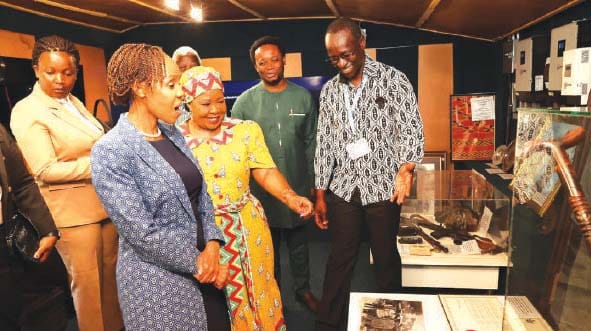Tendai Rupapa Senior Reporter
BOTSWANA First Lady Mrs Neo Jane Masisi yesterday capped her three-day working visit to Zimbabwe with a tour of the Museum of African Liberation in Harare where she underscored the need for Africans to treasure and preserve their history and heritage sites.
She also toured and had an appreciation of the National Gender-Based 575 call centre.
The call centre is in the office of First Lady Dr Auxillia Mnangagwa, who occasionally personally attends to callers as part of her mission to cultivate homes that are free of violence and other forms of abuse.
At the museum, the First Ladies visited sites that include the Museum of African Liberation, the Liberation Mall site and the Heritage Village.
Amai Mnangagwa is the patron of the Heritage Village.
The recognition was in support of her sterling efforts in reviving the country’s traditional values and norms.
The Liberation City, which houses the Museum of African Liberation, gives every African country a slot to exhibit mementoes from the struggle against colonialism.
At the museum, the delegation were shown many things that include a television set which belonged to the late Father Emmanuel Riberio, which was said to be the only television set in Highfield.
Liberation struggle fighters would reportedly meet at his home to strategise under the guise of watching television.
There were also ornaments from other countries.
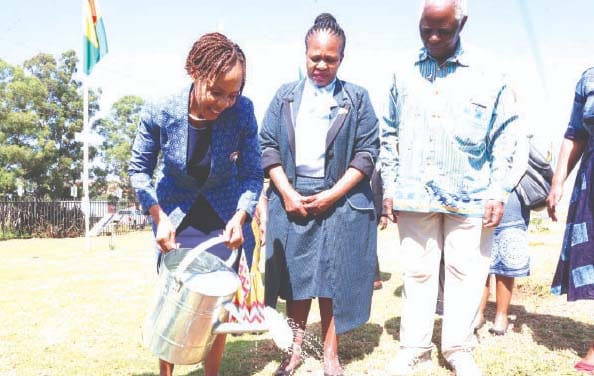
Africans, Mrs Masisi warned, risked losing their uniqueness by not teaching their children about the continent’s high-value culture.
Moving arm-in-arm with her host Dr Auxillia Mnangagwa, Mrs Masisi remarked that the design of the museum was world-class and showed the great potential of Africans.
“I have just been to the African Liberation Heritage Site and it’s a place that says as Africans we have come far and it is saying also the stories need to be told lest the stories disappear. But it also says that we will always be one and we are together and we should continue to be together.
“For myself, ideas are already running around in my mind to say what am I taking back home with me. One thing that it has also shown me is that the talent is right here.
“We saw the design and we saw the model. It’s just world-class stuff and all of this conceived and drawn up by our African brothers and sisters,” she said.
Mrs Masisi was charmed that her country was part of the museum.
“I am also very excited that as Botswana we are part of it. Not only are we a part of it, I saw our flag, I saw our tree, I saw a pillar showing that our Botswana story will also be included there,” she said.
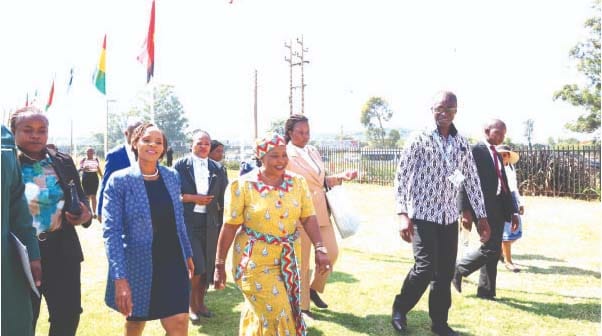
Commenting on the Heritage Village she said: “I am also very excited about this Heritage Village place as we are seeing just how our children will use this. A lot of us think that because we have educated our children and we are raising them in the cities, we have put beside our culture and where we came from.
“It reminds me personally to say that if every bit of our culture was put in place for a purpose. The stories were told around the fire by our gogos and our grandfathers. The way we would go out and perhaps tend to the chickens. All of it was in building us to be who we are today.
“It is very unique. It is teaching our children that if they lose this they are losing their uniqueness and your high value stands in your uniqueness. I must thank you once again, Your Excellency, dear sister Dr Auxillia Mnangagwa, for exposing me to so much.
“The trip is coming to an end and I must say I have been to university in just three days, learning from one of the very best and I must thank you and the fact that you expanded it.
“When I came my focus was on women’s economic empowerment, but she went forth to expose me to this area and I was asking how I fit women’s economic empowerment into initiatives such as this because there is so much opportunity there.
“Thank you again and let me thank the team and as they say you never forget to thank your elders because this is where the blessings come from,” she said.
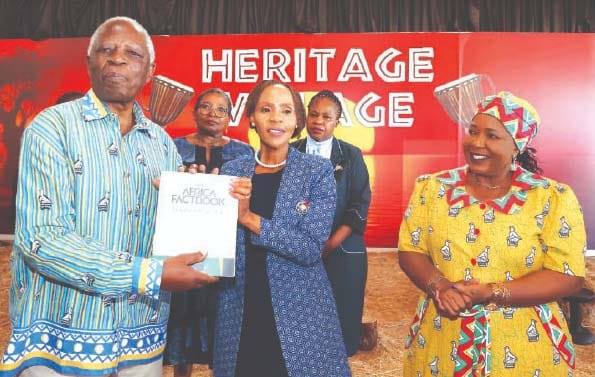
Dr Mnangagwa expressed gratitude that Mrs Masisi and her delegation had seen first-hand the work that she was doing.
“This is a first working visit from a First Lady from a neighbouring country and I am happy that she has seen all that I am doing here and here where we are, she has learnt a lot and she has already started giving me some ideas.
“When you are a mother, the motherly instinct in us is the one she is using and has started giving me some ideas already. All of us are free to come here anytime. The ideas will be more and will benefit our country. We are saying this should be put in the school curriculum so that our children learn from a tender age until they grow about our history and culture.
“This is something that we are passing on to them and we want them to learn it, be in it, live in it and then leave it to the next generation. It’s a generational history that has to be passed on. I am happy there is now life here at the Heritage Village.
“Food is being served and you will taste so many cuisines from other African countries. If your family wants to eat food from Botswana there is a kitchen for Botswana. You want to eat from Eswatini, there is a kitchen for Eswatini.
“That is something that we did not have as a nation in Zimbabwe and in Africa. This is very important and as mothers we are happy,” she said.
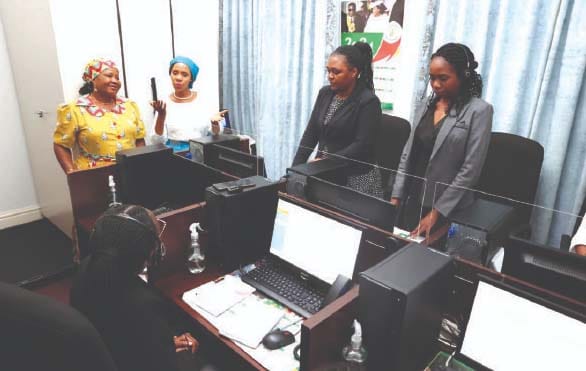
At the GBV Call Centre, the two First Ladies had a long chat with the staffers who informed them what they do and the arms of Government they work with.
“We work with the Zimbabwe Republic Police, the Department of Social Welfare, the Ministry of Health and other relevant ministries. We log in the calls coming in. We log in the age, location, gender and the nature of the case.
“The moment we do that, the case tracking system enables us to retrieve back these cases in case you want to do a follow-up. This helps us to gather our statistics every week,” one of the staffers said.
Dr Mnangagwa sought to know the most common cases.
“What type of cases are you receiving mostly that we can say may be prevalent in all the 10 provinces?” she asked.
The staffers responded: “We have physical abuse cases, we have economic abuse, we have sexual abuse that is marital rape for people that are married and we also have inheritance issues, maintenance issues, drug and substance abuse cases, child marriage cases but they just vary. There are a lot of cases that come to the contact centre.”
Mrs Masisi asked about the two which were most common.
“There is physical abuse and emotional abuse which we can downgrade to economic abuse because the moment a couple starts to argue in terms of their financial status it relates to that gender-based violence,” one of the call centre staffers said.
Dr Mnangagwa sought to know whether the call centre received calls from men in distress.
“In most of our cases, we deal with women. Her Excellency comes into this office, sits and answers some of the calls.
“When she answers, the men also get confidence from the work that she does so they are phoning because she is a mother who is not discriminatory. We get the assistance that we want. Our figures for men are also coming up,” said one of the attendants.
“Are they being beaten up,” Dr Mnangagwa further inquired.
“Yes, there are women who beat up men. Today I have got a case that I received from Chipinge about a man who was doused with petrol by his wife and was set on fire.
“Fortunately for us, he is alive. He was taken to hospital. When he was calling today he said he wanted to talk to the First Lady. I want to tell her that her systems are working and I am being assisted and the case is in the courts and the woman is on trial,” she said.
Dr Mnangagwa hinted at expanding the call centre and had words of advice for the staffers.
“I feel that the calls that we are receiving are coming from the whole country and we need a bigger place and more personnel to answer calls.
“This also teaches the people that it is bad to fight one another. You must not do that because the law will catch up with you,” she said.
Mrs Masisi applauded Amai Mnangagwa for her vision which prompted her to set up the call centre.
She said it was her wish to set up the same in her country. – Herald

